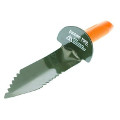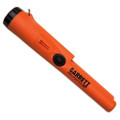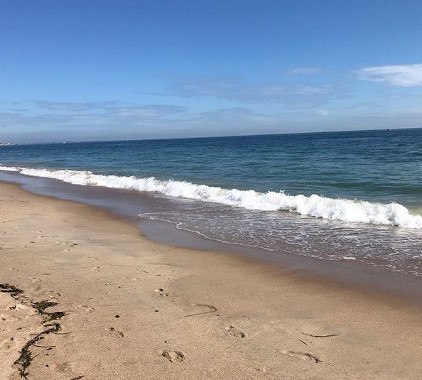New England is one of the most historic regions of America. The nation we know today sprung from this region and its influence continues to be felt across the country. New England's history is so extensive that even its smaller states boast endless treasure hunting possibilities. Rhode Island is the best example of this.
Rhode Island is the smallest state by area in all of America. Despite this, it played a vital role in the Revolutionary War. As such, buttons, badges, and bullets belonging to former soldiers can still be uncovered using a metal detector.
The key to metal detecting success in a small state like Rhode Island is to focus your search on areas that are known to be productive. Below, you'll find a list of such locations, as well as the laws you must adhere to while exploring them.
Laws
Metal detecting in Rhode Island is regulated by the Archeological Resources Protection Act. The ARPA is a federal law regulating metal detecting all across America. Its aim is to preserve items of historical and cultural significance. This law prohibits the removal of man-made objects more than 100 years of age from public ground.
The ARPA does not apply to metal detecting done on private property. Anyone planning to use their metal detector on private property should obtain the written permission of the landowner beforehand.
Local Rules and Regulations
Metal detecting isn't as popular in Rhode Island as it is in some other states. This is actually advantageous, as it means the state hasn't introduced too many laws governing the hobby. Of course, there are still a few things you should keep in mind.
Very few sites are off limits for metal detecting in Rhode Island. The only places treasure hunters aren't allowed to visit are those of archaeological importance. There is some debate as to what exactly falls under this label. If you're unsure if a location you plan on visiting is off limits, then you should contact the site's authorities.
Metal detecting is permitted in state parks across Rhode Island. But some parks require you to obtain a permit beforehand. This is also the case with national parks.
Land owned by the Bureau of Land Management is approved for metal detecting. This gives Rhode Island a distinct advantage over many other states. However the downside is that you are forbidden from keeping any items you uncover.
Best Metal Detecting Equipment
| Product | ||
|---|---|---|
| Metal Detector |  |
|
| Edge Digger |  |
|
| Pin-Pointer |  |
|
| Knee Pads |  |
Best Spots
Below we will review the types of spots that can yield positive results.
Private Property
As mentioned above, Rhode Island's metal detecting laws are not restrictive. Nevertheless, some metal detector hobbyists still feel the need to escape them. This can be done by focusing your activities on private property.
In Rhode Island, as in most states, metal detecting on private property is not regulated by the laws that govern the hobby on public property. On private land you are free to detect, dig, and extract without a permit. However you will need the landowner's consent.
Permission can be secured in a variety of ways, ranging from a handshake deal to written consent. We strongly suggest going with the latter. Without a written agreement between you and the landowner, you are leaving yourself wide open for a dispute should you make a valuable discovery.
Beaches

Rhode Island is famous for its beaches. These beaches are wonderful for a day lounging in the sun. They also happen to be perfect for an afternoon of metal detecting!
Over the years, metal detector hobbyists have made some big discoveries on Rhode Island beaches. Notable artifacts found include relics from shipwrecks, coins, and jewelry.
There is no shortage of productive beaches in the state. However we recommend putting these beaches at the top of your list:
- Ballard's Beach
- Charlestown Beach
- Crescent Beach
- Mohegan Bluffs
- Reject's Beach
- Watch Hill Beach
Parks
There is no law expressly prohibiting metal detecting in a Rhode Island state park. However in recent years state park officials have given people a hard time about metal detecting. Reportedly they have even begun issuing fines. For this reason, we strongly recommend asking state park rangers for the policy before metal detecting in a specific park.
If you do receive permission, then you will be sure to enjoy metal detecting in Rhode Island's parks. These parks are known to be extremely productive. It's not uncommon to find old relics lying in the soil of a Rhode Island state park. We suggest focusing your attention on larger parks. At the larger parks you'll have more space to explore and a greater chance of unearthing something noteworthy.
Ghost Towns
During the 19th century, new towns and villages emerged all over America. Seemingly overnight, buildings were erected and entire communities were established. They vanished almost as quickly as they appeared. These are the ghost towns we know today. Suffice to say, Rhode Island is home to some ghost towns.
Ghost towns hold great allure for treasure hunters. While you are unlikely to find war relics in a ghost town, you have a high probability of finding more personal items. These items can include kitchen utensils, gardening tools, photo frames, and more.
For the highest chance of success, try visiting the Rhode Island ghost town of Napatree Point.
Metal Detecting Clubs
Rhode Island is home to a small but tight-knit community of metal detector hobbyists. These treasure hunters welcome new hobbyists to the state. Whether you're looking for insider tips or just some friends to talk about the hobby with, you should consider joining one of the following Rhode Island metal detecting clubs:
- New England Gold Prospectors and Treasure Hunters
- Rhode Island Metal Detecting Finds
- Rhode Island Relics
Conclusion
Rhode Island is a good state for metal detecting. If you are patient and attentive, then you can expect your metal detector to lead you to some interesting discoveries.
Neighboring states also offer good opportunities. We recommend metal detecting in Connecticut and metal detecting in Massachusetts.
